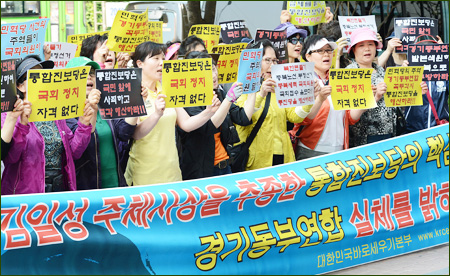Leftist party losing support base

Conservative activists chant slogans denouncing the selection rigging for the proportional representation lawmakers of the minor opposition Unified Progressive Party (UPP) in front of the UPP headquarters in Seoul, Tuesday.
In less than a month after the nation’s support for a left-wing party hit a record high of over 10 percent, its popularity began to burst like a bubble in the face of an escalating intraparty election scandal.
According to a poll conducted Monday by the pollster Realmeter, the support rate of the minor opposition Unified Progressive Party (UPP) plummeted to 5.7 percent, down from that of 10.3 percent shown at the April 11 National Assembly elections.
The left-leaning party managed to clinch six proportional lawmaker seats in the Assembly elections by winning 10.3 percent of votes cast in the selection of the nation’s 54 proportional parliamentary representatives.
The approval ratings of the UPP have been sharply falling since May 1, when the party’s internal investigation team confirmed that serious irregularities occurred in the selection of its proportional representation candidates.
Realmeter surveys showed that the UPP’s support rate plummeted to 6.8 percent on May 2 and went further down to 6.6 percent on May 4.
Observers say the UPP, a coalition of three leftist parties, will likely plunge to a level that it offsets the benefits of the pro-North Korean Democratic Labor Party (DLP)’s merger with two smaller liberal parties.
The local pollster’s survey found the DLP’s approval rating was 4.8 percent prior to its merger with the People’s Participation Party and New Progressive Party, two of which had approval ratings of less than 3 percent combined.
“The support rate of the UPP will slip to a level of the DLP unless voters can feel the troubled coalition party is making enough efforts to renew itself,” said Lee Taek-soo, head of Realmeter.
Realmeter’s latest poll shows that the support rate of the ruling Saenuri Party inched up to 44.1 percent, up 0.5 percent from last week, while that of the main opposition party also rose to 32.7 percent, up 0.8 percent.
Political pundits say the UPP may soon end up being split into two or more political parties as there has been no sign that the rift between moderate members of the party and the extremists could narrow.
Led by the moderate members of the party, who are considered a minority in the UPP, the National Steering Committee passed a resolution on May 5 that recommended all four co-leaders and proportional representatives embroiled in a vote-rigging scandal to step down.
However, Rep. Lee Jung-hee, one of the co-leaders and former head of the DLP, and her followers have refused to accept the committee’s decision. She describes the party’s internal probe as “a witch hunt.”
Lee has thus far had the greatest influence in the party and is considered the leader of the UPP’s largest faction, which is rooted from a clandestine pro-North Korean group of the DLP.
The remaining three leaders, including Rhyu Si-min and Shim Sang-jung, have expressed their strong opposition to Lee’s refusal to accept the UPP’s mistakes in properly managing intraparty elections. <Korea Times/Lee Tae-hoon>





















































